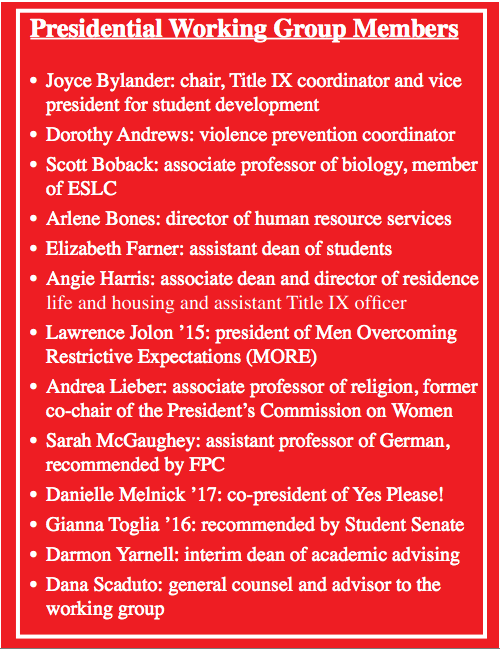Roseman Reappoints Working Group
President Nancy Roseman announced on Monday the new members of the Presidential Working Group on Sexual Harassment, Misconduct and Title IX. First established by president William Durden ’71 in Sept. 2012, the group has grown in size from 10 to 13 members to increase student and faculty representation.
In an interview on Tuesday morning, Dean of Students and Title IX Coordinator Joyce Bylander said that the group’s membership was determined by recommendations from the chairs of the Enrollment and Student Life Committee (ESLC), Faculty Personnel Committees (FPC) and the President’s Women Commission. Dorothy Andrews, Violence Prevention coordinator and a member of the working group, recommended two students to represent stakeholder groups on campus, while Student Senate made one recommendation for an all-college student representative.
Altogether, the working group is composed of three student representatives, three faculty members and seven administrators. The 2012-2013 group, in contrast, was composed of two faculty members, two student representatives and six administrators.
“The reason for increased student and faculty representation was to make sure we had people with a real stake in these issues serving on the committee,” Bylander said.
According to Roseman, the charge to the group is to “review Title IX compliance at the college, including all applicable policies and procedures on sexual harassment and misconduct.” To this end, Roseman said on Tuesday that the committee might also choose to consult outside legal experts, as it did from 2012-2013.
The scope of the group’s work will depend on legal outcomes from federal agencies such as the Department of Justice or Office of Civil Rights. Regulations that could affect the College’s Sexual Misconduct Policy include possible amendments to the Violence Against Women Act or additions to the 2011 Dear Colleague Letter. If the group is required to make changes to college policies in accordance with federal regulations, Bylander said that they will report their work out to ESLC and FPC.
“I don’t anticipate a lot of changes [to the policy] unless the rulemaking is more [drastic] than I think,” Bylander said.
Following Roseman’s announcement on Monday, students and faculty have expressed mixed reactions to the new composition of the working group.
“I think it’s encouraging that the Working Group is being reconvened,” said Doug Edlin, associate professor of Political Science. “I think it’s a small but notable improvement to have one more student and one more faculty member on the Working Group, [and] the people I know personally who are members of the Working Group are excellent choices. But I remain concerned by the fact that there are three students, three faculty members and six administrators, together with college’s attorney. I was hoping that the representation of students, faculty and administrators would be equal.”
Ryan Protter ’16 agreed that the number of faculty members and administrators ought to be “on balance,” but expressed skepticism of student involvement in policymaking.
“I think that student involvement isn’t necessary … that they should observe what’s going on and report back,” said Protter. “Faculty have the same interests as [students] do… and a lot have the same views as us. Because they’re professors, they’re better informed to make a decision on… a policy. I’m all for having students there, but… it’s better for [professors] to [make policies].”
Student Senate President Will Nelligan ’14 stressed the importance of mechanisms of shared governance.
“While I appreciate the addition of a third student to the Working Group, the substantive impact of that change…remains to be seen,” Nelligan said. “The issues that have emerged in the past few weeks are the result of a failure to meaningfully engage representation and shared governance. When students and faculty on the committee are engaged in a dialogue about this policy… with the entire Dickinson community, [these] issues recently can finally be resolved.”
Bylander encourages anyone with questions or concerns about the policy to contact members of the working group by email.




